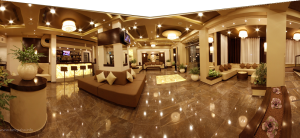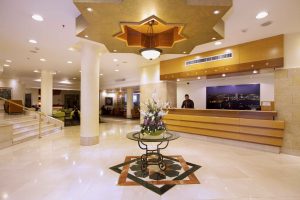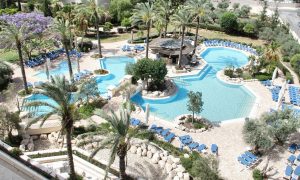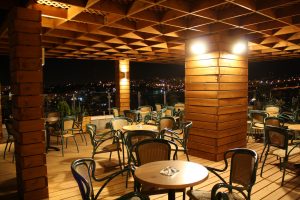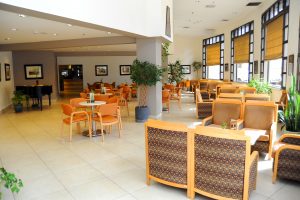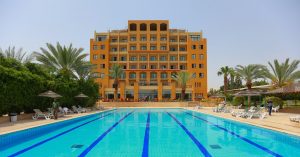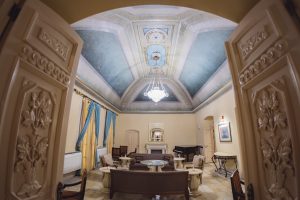Excavations on Tel al-Sultan have revealed layers of cities and human habitation dating as far back as 9600–7700 BC, around 10,000 years, earning Jericho the title of “the oldest city in the world.” Tel al-Sultan is the site where humans first used the alphabet, settled in a society, adopted religions, and created literature, making it a meeting place for diverse cultures and ideas that shaped the world we know today. This rich history and diverse past that contains abundant cultural and archaeological heritage as well as the holy sites of the three monotheistic religions (Islam, Christianity, and Judaism) have enabled this part of the world to play a central role in the development of human civilizations and thus be a unique tourism destination. Two of the most prominent sites – the birthplace of Jesus and the site of the Isra’ and Mi’raj (the miraculous journey of the Prophet Mohammad (PBUH) from Mecca to Jerusalem and on to heaven) – have also added great value to tourism in Palestine, giving it a competitive advantage at the regional and international levels.
Christian believers see Palestine as the place of pilgrimage par excellence, visiting such significant sites as the Church of the Holy Sepulcher in Jerusalem and the Church of the Nativity in Bethlehem. Muslim believers see Palestine as the land that contains the third-holiest site in Islam, Al-Aqsa Mosque in Jerusalem, which God commands all Muslims to visit.
From ancient times till today, pilgrimage has been a powerful incentive that has motivated people to travel to religious sites and holy places across Palestine, as well as to stay in Palestinian hotels and family homes. It goes without saying that the tourism sector is of significant importance to the Palestinian economy, given that the country hosts millions of tourists every year, and the numbers continue to rise. According to the Palestinian Ministry of Tourism and Antiquities (MOTA), Palestine hosted more than three million tourists annually during the past few years – tourists and pilgrims who came from around the world. The increase is due in part to the variety of tourism options, such as community-based tourism, cultural tourism, ecotourism, and wilderness trails for hiking, biking, and climbing. In comparison, the number of Muslim religious pilgrims is still very small, considering the importance of Palestine to the Islamic world.
The development of the Palestinian tourism sector started in the middle of the nineteenth century, but in the year 1995, Palestinian tourism began to be divided into five categories: cultural and physical; religious; historical and geographical; diplomatic and political; and natural and scientific.
There is no doubt that the growing number of tourists during the last few years has increased the demand for overnight accommodation, reaching more than 1.5 million overnights. This demand has encouraged Palestinian tourism stakeholders, together with MOTA, to develop the capacity of the accommodation industry and to upgrade other tourism services.
Today, the accommodation industry in Palestine has witnessed an evolution in its capacity as well as in the quality of services. Hundreds of millions of dollars were invested in this industry, and many new four- and five-star hotels, as well as economy accommodations have been created. In addition, homestays have become very popular among visitors throughout Palestine.
In order to ensure the ability of the accommodation industry to attract more tourists and to enable it to compete at the international level, MOTA, in collaboration with its stakeholders, has finished the classification project through which most Palestinian hotels have been categorized according to European standards.
The main reason for the increase in tourism to Palestine is the fact that Palestine is a safe tourism destination, and according to MOTA records, there have been no reports of incidents that have endangered any visitor.
As Arabs, Palestinians also share the attribute of generous hospitality, probably the most outstanding feature of Arab culture. Extending warm hospitality is more than just an admirable thing to do; it is a matter of honor as well as a sacred duty. This venerable trait has its origins among the Arab Bedouins, especially those in the Arabian Peninsula, who have always lived in a desert environment. Traveling nomads were required to depend upon each other. Therefore, hospitality became necessary for survival in the face of severe thirst and hunger, and sudden raids or enemy attacks. In the course of time, these essentially Bedouin customs of hospitality became common to all Arabs, including villagers and city people. In other words, Arab hospitality is not simply a way to make visitors feel at home, it’s a fundamental cultural duty that demonstrates virtue. Hospitality is shown regardless of personal cost and to a point where families judge themselves and each other according to the amount of generosity shown to their guests. Whether one’s guests are relatives, friends, neighbors, or relative strangers, they are welcomed into the home and to the dinner table with much the same kindness and generosity.
Arabic meals are more often a festive, warm, and casual experience than a formal affair. The guests are made to feel right at home and are invited to sample everything offered. In fact, most Arab hosts feel that they are failing in their role as host if their guests neither try all the various courses of the meal nor eat more than is normally comfortable. The importance of hospitality to guests is something a visitor to an Arab home must understand.
From ancient times till today, Palestinians have welcomed guests into their homes (homestays), providing all that they need to stay warm and well-fed. Present-day community-based tourism offers premium hospitality in Palestinian family homes to visitors who are welcomed with food, sweets, and Arabic or Turkish coffee.
It is important to mention that the Palestinian government is indeed paying attention to the tourism sector and doing its best to build and maintain the infrastructure, legislate laws and bylaws, and encourage marketing in order to protect and develop this sector and increase its revenues. According to MOTA, the tourism sector makes up 14 percent of the Palestinian GDP. This percentage supports the understanding that tourism has great potential for development but needs more investments and effort from public, private, and other tourism stakeholders. It also requires efficient and effective cooperation and collaboration among all these parties to develop new types of tourism, especially Islamic tourism.
It is important to note that the establishment of a Palestinian sovereign independent state would encourage millions of Arab and Muslim pilgrims to visit Al-Aqsa Mosque and other holy places in Palestine, especially Jerusalem, Bethlehem, and Hebron, for two reasons: first, it would signal the end of all the Israeli obstacles and measures that were imposed to hinder the development of the Palestinian tourism sector, mainly its control of borders and visas; and second, it would honor the holiness of Al-Aqsa Mosque for Muslims and allow the integration of Jerusalem with Mecca and Medina.
An end to the Israeli occupation of Palestine would mean that the latter could host at least 30 percent of the KSA (Kingdom of Saudi Arabia) Hajj and Umrah market which, according to KSA national tourism strategy, is expected to reach 30 million pilgrims in the year 2030. This means that Palestine may welcome at least 9 million pilgrims annually, which equals 30 percent of the 30 million, generating an estimated $10 billion (9 million pilgrims multiplied by $1,113 per pilgrim).
If the political situation remains the same, it is expected that the number of Muslim pilgrims could reach at least 10 percent of the KSA Hajj and Umrah market, which amounts to 3 million pilgrim-visitors to Palestine. This estimated number is based on the Muslim nationalities that do not need visas issued by the Israeli occupation authorities to visit Palestine, such as the people of China, Russia, India, Europe, the United States, Turkey, Canada, and others.
Considering the importance of Palestine to Christians and Muslims, the statistics are low. However, they still present a great opportunity to develop the accommodation sector and tourism services in general. No doubt that solving the political conflict would boost the tourism sector tremendously and would release Palestine from its dependence on the international donor community.
Article photos courtesy of the Arab Hotel Association.


